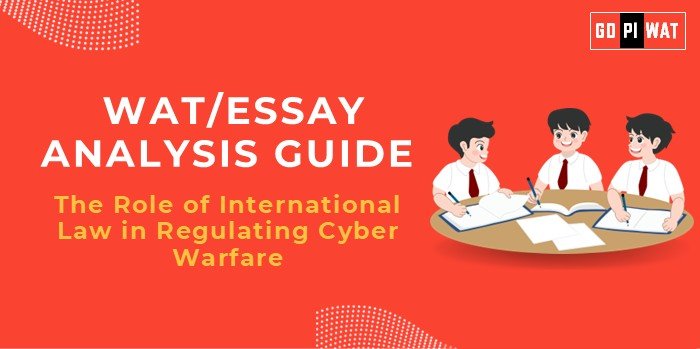📋 WAT/Essay Analysis Guide: The Role of International Law in Regulating Cyber Warfare
🌟 Understanding the Topic’s Importance
The significance of cyber warfare regulation lies in safeguarding global peace and security. For B-schools, this topic connects with risk management, international relations, and technology’s role in shaping policy.
📝 Effective Planning and Writing
- ⏳ Time Allocation:
- Planning: 5 minutes
- Writing: 20 minutes
- Review: 5 minutes
- 📋 Preparation Tips:
- Compile recent data on cyber incidents and examples of international cooperation.
🎯 Introduction Techniques for Essays
- ⚖️ Contrast Approach: “While cyber technology drives global innovation, its weaponization has created new challenges that international law struggles to address.”
- 💡 Solution-Based Approach: “A robust international legal framework is vital to regulate the rising menace of cyber warfare, ensuring accountability and peace.”
📚 Structuring the Essay Body
- 🏆 Achievements:
- Mention treaties like the Budapest Convention and the work of the UN Group of Governmental Experts (UNGGE).
- ⚠️ Challenges:
- Highlight attribution issues, lack of universal norms, and emerging technologies.
- 🔮 Future Outlook:
- Stress the need for adaptive legal frameworks and stronger global cooperation.
✅ Concluding Effectively
- ⚖️ Balanced Conclusion: “While current efforts offer a starting point, international law must evolve dynamically to address the growing complexities of cyber warfare.”
- 🌍 Global Comparison Conclusion: “By learning from nations like Estonia and frameworks like the Budapest Convention, the global community can build a resilient legal infrastructure for cyberspace.”
📊 Analyzing Successes and Shortcomings
- 🏆 Key Achievements: Enhanced focus on cyber norms and increased collaboration.
- ⚠️ Ongoing Challenges: Enforcement issues, technological disparities among nations.
- 🌍 Global Context: Success of nations like Estonia in cyber defense offers valuable lessons.
🌱 Recommendations for Sustainable Progress
- 📋 Develop a universally accepted cyber code of conduct.
- 🌐 Promote transparency and information sharing among nations.
- 🤝 Encourage public-private partnerships to combat cyber threats.
📄 Sample Short Essays
⚖️ Balanced Perspective
International law provides a foundational framework for regulating cyber warfare. However, enforcement gaps and technological advances necessitate continual updates to ensure its effectiveness in the face of evolving threats.
🔧 Solution-Oriented
To combat the growing threats of cyber warfare, the international community must prioritize adaptive legal frameworks that incorporate emerging technologies and ensure accountability across nations.
🌍 Global Comparison
Drawing lessons from Estonia’s cyber defense strategies and the Budapest Convention, international law must evolve to address the unique challenges posed by cyber warfare.


